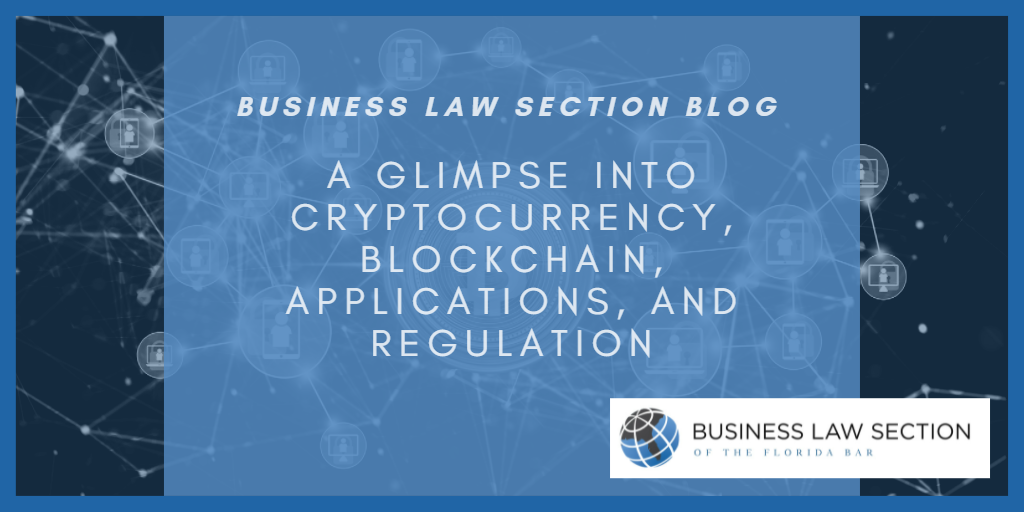Negin Kordbacheh, Esq.
Gary B. Louima, Esq.
The last decade brought a wave of cryptomania. Fortunes were made and lost, and in 2021, we saw new all-time highs and explosive growth. Many believe that cryptocurrencies, or “crypto” for short, are on the verge of displacing established national currencies such as the U.S. dollar, the British pound, the Euro, and the Canadian dollar. While others believe cryptocurrencies are a fad or a scheme, one thing is certain: it is here to stay.
What are Cryptocurrencies?
Cryptocurrencies are digital assets, used as virtual currencies, that do not exist in physical form. Because they are secured by cryptography, counterfeiting and double-spending are nearly impossible. Crypto can be managed on any computer or device connected to the internet. Anyone can mine, buy, sell, or collect crytpo, regardless of their location—no bank required. Crypto offers unlimited transactions, purchases, and withdrawals, and transaction costs can range between low and nothing at all. Many national governments do not regulate cryptocurrencies because they are considered alternative currencies, meaning they exist outside the bounds of state monetary policy. Bitcoin, created in 2009 by Satoshi Nakamoto, a pseudonymous person or group, is the first cryptocurrency and the first to be used on a wide scale.
Blockchain technology, a distributed ledger enforced by various computer systems, serves as the platform for keeping digital records of public transactions for most cryptocurrencies. Blockchain records transactions repeatedly in a slow yet secure manner, making the record virtually impossible to edit. Decentralization is the guarantee of the security and freedom of encrypted currency. Every ten minutes, the blockchain network checks in to ensure that it is in a state of consensus. The network reconciles every transaction in ten-minute intervals, acting as a self-auditing ecosystem of digital value. Although blockchain exists without crypto, crypto cannot exist without blockchain at this time. Blockchain is uniquely positioned to expand beyond the realm of cryptocurrency using smart contracts and verifying a multitude of transactions. Transactions will become faster, more digitized, safer, and more global, allowing for the maintenance of records without the risk of data piracy.
Future Applications
Crypto and blockchain, in conjunction with existing technology, could revolutionize a wide range of industries and human interaction. For example, using crypto with virtual reality could revolutionize the gambling industry by allowing people across the globe to connect in a virtual space and gamble using the same currency. Blockchain could eliminate cheating and gambling manipulation, as each draw of a card, dice roll, and bet placed would be transparent and verified with the ability to cash out almost instantly after each game.
Blockchain’s transparency and verification capabilities have government applications as well. Employing these systems to engage with government functions such as tax collection and election supervision could significantly reduce tax and election fraud. Blockchain technology in the financial technology space would create a safer environment for financial transactions and protect classes of people who have been historically subject to deceit by those with access to their finances. In the legal industry, we could see a reduction in fraud through IOLTA accounts and in trustees misappropriating funds. In addition, this level of transparency in transactions would greatly impact money laundering, as widespread adoption could make it extremely difficult to “fudge the numbers.” Processes such as the recording of deeds could be on the blockchain, preventing issues with ownership stemming from recordation errors like wild deeds. Blockchain also has applications in the criminal justice system by preventing issues with chain of custody of evidence with law enforcement. With the use of NFC (near-field communication chips), badges can be created to track evidence securely.
Regulation
In Costa Rica, citizens have widely accepted crypto. Under current law, cryptocurrencies may be classified as “quasi-money” or as a “means of payment.” There, it is legal for employers to pay employees in cryptocurrencies. El Salvador recently became the first country to adopt Bitcoin as legal tender. We could see more countries in the future, like Costa Rica or El Salvador, become crypto-friendly, or even more optimistically, countries could adopt their own cryptocurrency, which could lead to new federal and state departments to regulate cryptocurrency and crypto-economics. While there are pertinent constitutional issues that must be addressed as cryptocurrency grows, over 30 U.S. states have introduced bills in their legislatures concerning cryptocurrency and blockchain.
The Florida Office of Financial Regulation and the Department of Revenue will play a large role in the integration of cryptocurrency into the Florida economy. The advent of Bitcoin ATMs (automated teller machines) has allowed for the recognition of cryptocurrency as a “payment instrument” under § 560.103(29), Fla. Stat., by the Florida Office of Financial Regulation. States like Louisiana and Minnesota have already proposed legislation to accept cryptocurrencies for payment of taxes and fees. Florida could become a leader in crypto regulation and acceptance. Whether it is the Department of Revenue collecting cryptocurrency for taxpayers to satisfy tax obligations or the creation of another state department, the acceptance and subsequent limited regulation of cryptocurrency can allow Florida to reap benefits in the crypto-economy.
For additional information on blockchain, tokenization, and distributed ledger technology, consider viewing CLE Course 5776 – Blockchain and Tokenization Made Simple, presented by Daniel S. Maland, Esq., and Herwig Konings at the Business Law Section of The Florida Bar Winter Meeting 2022, which you can view any time on the Business Law Section’s Youtube channel here: https://youtu.be/ZWYXV2jnfMI

